Some of the links on this page are affiliate links. When you make a purchase through an affiliate link, I earn a commission at no cost to you. See my entire disclosure policy for all the boring details.
In this post, I will explain the problems with the new room sharing recommendation as well as 10 benefits of your baby sleeping in his own room from birth.
We had 4 babies in 5 years (no multiples) – all with varying sleep personalities. And all 4 slept (primarily in their own rooms) 10-12 hours through the night by 12-16 weeks old. They all took 2-4 predictable, reliable naps from 4 weeks old onward, and they are all still great sleepers. I’ve also helped thousands of parents figure out how to get their babies on a predictable eating & sleeping routine from infancy with my short & sweet ebook guide.
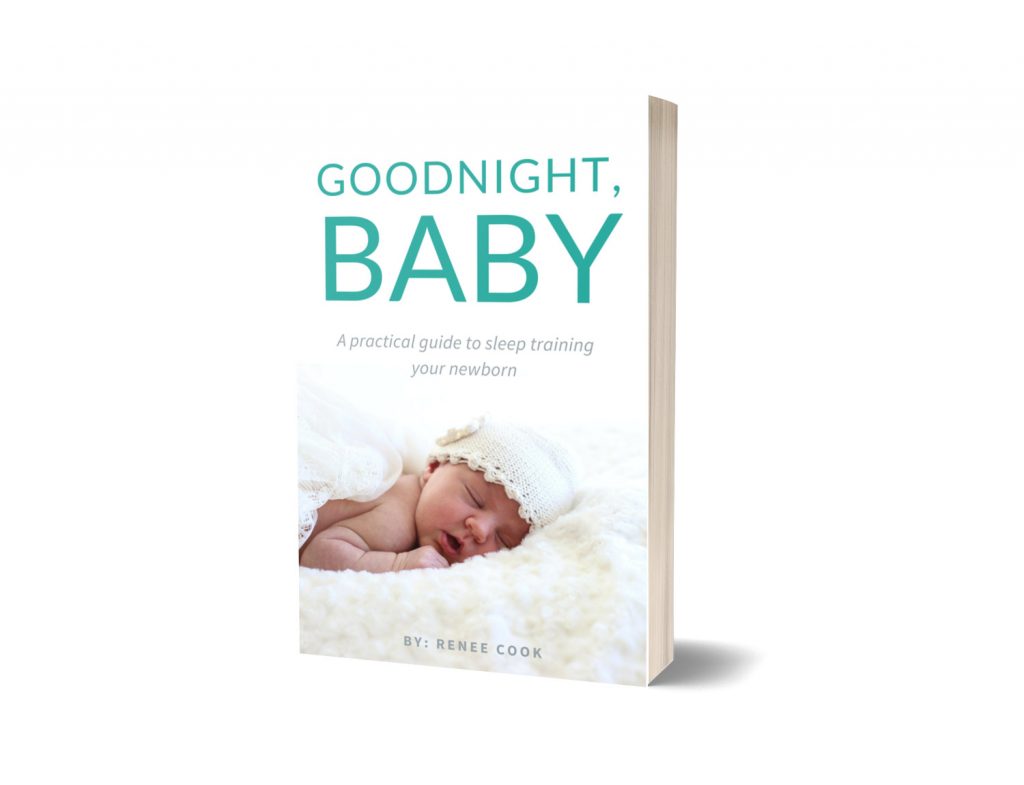
You don’t have to be sleep deprived for the first year of your child’s life. So, let’s dig into the pros and cons of where baby sleeps and learn 10 benefits of letting baby sleep in their own rooms.
Room Sharing Recommendation
Safe sleep practices are hotly debated amongst parents and doctors.
According to the American Academy of Pediatrics (AAP), the best ways for your newborn to sleep are:
- On a flat firm surface
- On his back
- Without any soft covers or blankets (including no crib bumpers or crib blankets)
Other ways to reduce the risk of sudden infant death syndrome (SIDS death) include:
- Avoidance of exposure to tobacco smoke during pregnancy and afterwards
- Avoidance of exposure to alcohol or drugs
- Routine immunizations
- Use of a pacifier
- Continued breastfeeding
But in 2019, for the first time, the AAP recommended for babies to sleep in their parents’ room for the first six months. And, that recommendation has caused a lot of debate amongst professionals!
Careful study finds that there are some serious problems with the studies they used to determine that, and it has many doctors up in arms.
This article from the director of the Yale Pediatric Sleep Center dives deep into the issues with the AAP’s recommendation. His article is worth a read once you’re done here!
What I’m NOT Saying:
I’m not saying you can never sleep with your baby. A newborn sleeping on your chest is one of the BEST feelings in the world. And those tiny newborn snuggles sure don’t last long! You should soak those up whenever you want.
But, you should also be able to take a shower during baby’s nap! And you should be able to help your child sleep increasing amounts of time those first four months so that you don’t live in a constant state of extreme sleep deprivation for the first 12-24 months of your child’s life.
Putting baby down to sleep on his own from the beginning is one key to a healthy baby’s sleep habits. So, let’s unpack the “pros” of putting baby to sleep in their own bed from the beginning.
(Side note – here are my tips for what to do if your baby seems like he won’t sleep unless held!)
1. You Won’t Have to Transition Your Baby Out of Your Room Later.
This reasoning falls under the logic of “begin as you mean to go on.” We tend to take this approach to parenting, whenever it’s sensible.
If you don’t want to deal with a baby who screams and cries because they can’t sleep with you in 8 months or 2 years, then don’t start sleeping with your baby all the time now.
If you don’t want to have a baby who needs to sleep in a car seat, don’t make a habit of driving around to get them to fall to sleep.
Of course, sometimes baby will fall asleep on you, or you’ll feed the baby at 5 am, and then both doze back off in bed until 7 am.
But, as a pattern, if you lay baby down to sleep in his own bed rather than letting him sleep in the parents’ room, you will avoid a nasty transition out of the parents’ bed a few months later.
2. Baby Will Sleep Longer & More Soundly
If you consistently put baby to sleep in his own bed, with a white noise machine on in the background, he will learn to sleep soundly and get more restorative sleep.
Babies who constantly wake up after 45-60 minutes are not getting the right amount of sleep or sleeping deeply enough to feel rested. They will be perpetually overtired… and cranky.
One mom who read my guide said she thought her baby was colicky until she started our method and realized he was just overtired!
If you start our gentle sleep training method with your newborn, including putting baby to sleep in his own bed most of the time, then he will get better quality of sleep and in turn be a more well-rested, happier baby.
3. Babies Can Get Back to Sleep on Their Own When They Stir
Babies go through sleep cycles just like adults. You know how you sometimes kinda-sorta wake up in the middle of the night, roll over, and go back to sleep? That’s most likely happening in the lightest phase of your sleep cycle.
The infant sleep cycle is about 45 minutes long, and every 45 minutes, depending on how soundly your baby is sleeping, he is very likely to do a baby-equivalent of kinda sorta waking up, rolling over, and going back to sleep.
But a lot of babies never learn to sleep through this transition in their sleep cycle, so they wake up crying and never nap longer than 45 minutes. (Maybe you know a baby like that?! Haha!)
The baby version of “rolling over” sometimes involves fussing of some sort or even a loud cry for a minute. Often, the baby is still asleep. He just cries a little during the stirring process.
If baby is sleeping in your bed, and he starts grunting and fussing next to you, you’re probably going to start feeding him just so everyone can get back to sleep as soon as possible. (But everyone will get less sleep this way!)
If baby is in a different room, you won’t hear the quiet grunts. And even if starts crying, you can give him a minute or two to see if he’ll go back to sleep. Especially if it’s been less than 3 hours!
If you start this process of letting baby figure out those sleep transitions from the beginning, your baby will learn to sleep through them.
Which leads me to my next point…
4. You Will Get More Sleep
If baby sleeps in a different room (and you’re following our method of waking baby up to eat during the day), you won’t get woken up by every little grunt. Baby won’t develop the habit of needing to nurse back to sleep every time he wakes, and you will be able to ACTUALLY GET SLEEP between each night time feeding.
Real sleep. Deep sleep. REM sleep. Where your body restores itself!
In fact, baby will likely stretch to 3-4 and 4-6 hours intervals by about 6 weeks old, and you’ll be able to wake up, go into the baby’s room (or closet or hallway or living room), feed the baby for 30 minutes, lay him back down, and go back to sleepe in your own bed for the next several hours.
Friends, you can get a good night’s sleep with baby in your house. I promise! You just have to put some work into good sleep habit training the first few months and it will get better!!
5. If You Don’t Put Baby in Your Room, He Can’t Smell You.
Babies learn their mom’s smell almost immediately after they’re born. An article on parenting.com summed it up well:
“Your baby will recognize your scent within days of birth. Researchers have found that 3-day-old infants are able to discriminate their mom’s milk from someone else’s by its smell. And not only does your baby know your scent, he loves it too. “A baby will snuggle his nose between your chin and shoulder,” says Alice Sterling Honig, Ph.D., professor emerita of child development at Syracuse University. “He’s thinking, ‘Oh, you smell so good. You’re my mommy!'”
– Source
Your smell makes your baby want to eat in the middle of the night. Which is the exact opposite of what you want! You want them to EAT DURING THE DAY and SLEEP AT NIGHT.
Of course, they need to eat every 3-5 hours during the night when they’re teeny tiny newborns, but all our kids have slept 10-12 hours by 12-16 weeks old. And by 6 weeks, they were stretching to 5-6 hours.
You do not need to feed your baby every hour during the middle of the night.
If baby is sleeping in your bed, or even right next to your adult bed in one of those bedside sleepers, she can smell you, and she’ll want to eat every time she’s even remotely awake or stirring.
6. You Can Get Baby’s Tummy Full During Middle of the Night Feedings
Getting baby full at each feeding during the day is a huge part of our sleep training method. (I provide an in-depth explanation of this in my sleep training guide.)
But, nursing a newborn for 10 minutes in the middle of the night will not fill baby up! They will want to eat on and off all night long. Short snacks at night lead to more night wakings.
Eventually, babies become very fast at nursing, but at first they are VERY SLOW. And very sleepy. So, when they fall back asleep after 10 minutes of nursing, you want to wake them back up so that they’ll eat a full meal.
When their midnight feeding actually fills them up all the way, they can go another 3+ hours until eating again.
Some of the other reasons listed above affected nursing as well. But this is the biggest one! If you want baby to sleep longer stretches at night ASAP, wake yourself up as fully as possible, go into their room, and try to nurse them until they’re full.
Do whatever can to keep baby awake and eating until he is full!!
These middle of the night feedings will probably take 30-60 minutes with a newborn because newborns are so slow and sleepy. Some ideas for helping baby stay awake are:
- Pull baby off the breast as soon as he starts dozing
- Diaper change
- Get him undressed
- Wet wipe on his toes
It’s nearly impossible to keep baby awake when he’s sleeping in your bed. If baby is sleeping with you, you are WAY more likely to just let them nurse back to sleep so you can go back to sleep ASAP.
But if you have to wake up and walk to their bed, you’re more alert, and more motivated to get them full so you don’t have to go back there for at least another 3 hours.
The other hidden “pro” here is that you will probably not hear them until they are fully awake and crying. When they first start waking to eat, they moan and grunt and stir until they’re fully awake. If baby is in your bed, you’ll likely wake up immediately and start nursing. They’re already prone to getting sleepy while eating, and if they’re not fully awake, it’ll be even harder to get them to eat a full feeding.
On the other hand, if you don’t hear them until they are AWAKE AND LOUDLY PROTESTING, “Mom come feed me,” they will be likely to vigorously nurse for at least the first 10-20 minutes. Then as they doze, you can wake them back up more easily.
7. Daytime Naps Will Be Easier for You & Other Caregivers.
The less baby relies on you to get them to sleep, the easier it is to get them to take consistent naps.
All 4 of our babies, plus countless others who have used our method can testify that naps are possible!
Kids vary in how much daytime and nighttime sleep they need, but they don’t vary that much. All little newborns need several good naps throughout the day in order to be happy when they are awake.
Consistently placing baby in their own bed to sleep from the time they’re a tiny baby will help them develop those good napping habits that you want them to have when they’re not so tiny anymore.
Plus, it makes it easier for other people to take care of your baby if baby knows how to go to sleep in their own bed.
8. It’s Better for Your Marriage
I don’t actually write much on this site about marriage, but I want to just say: it’s hard enough to make time for each other when you have a new baby. If you’re first time parents, there’s a MASSIVE adjustment.
Every baby after the first is also an adjustment to your family’s routines & norms.
- Nursing moms spend a lot of their time feeding baby and often don’t have energy leftover to even talk to their spouse, let alone anything else 😉
- Postpartum motherhood is not exactly glorious or sexy.
Regardless of where baby sleeps, new parents are exhausted. The goal should be to move out of this dazed-and-confused-exhaustion as fast as possible.
Putting baby to sleep in their own bed will accelerate that! I promise!
9. Safety Concerns
I’m not a doctor, nor should any of my advice be taken as medical!! Just speaking from one mom to another here.
On one hand, I am so sick of the scare tactics used to make you feel guilty about your parenting choices. The rate of sleep-related deaths these days is INCREDIBLY LOW compared to all of history. Risk factors are low these days too. Look up the numbers for yourself, and take a deep breath. Most choices you make as a parent are not life and death!!
Lots of doctors have expressed concern about baby sleeping in the parents’ bed and/or room sharing and how it relates to the risk of SIDS death. This quote from a new study summarizes the concern about unsafe sleep practices well:
While substantial progress has been made over the past several decades to improve the safety of infant sleep, the AAP recommendation that parents room-share with their infants until 12 months of age is not supported by data, is inconsistent with the epidemiology of SIDS, is incongruent with our understanding of socioemotional development in the second half of the first year, and has the potential for unintended consequences for infants and families. Our findings showing poorer sleep-related outcomes and more unsafe sleep practices among dyads who room-share beyond early infancy suggest that the AAP should reconsider and revise the recommendation pending evidence to support room-sharing through the age of 1 year.
– Source
A lot of medical experts recommend that the safest place for babies in the early months of life is on a firm sleep surface, in an empty crib to minimize risk of suffocation, in a separate room from their parents. This is totally between you and your pediatrician. It’s a good idea to ask your pediatrician for their advice and warnings when it comes to sleep-related infant deaths. I’m merely explaining why we’ve preferred this method of separate sleeping spaces with our newborn babies. Consider your own feelings & lifestyle & sleep preferences and make a judgement call 🙂
Here are some safe sleep recommendations for a safe sleep environment for baby:
- Use a firm mattress for a soft surface in your crib, bassinet, or play yard.
- Use soft bedding – cotton or jersey knit are our favorites
- No loose bedding – a tightly fitted sheet is best up to a year of age to prevent accidental suffocation
- We usually introduce a special blankie or some soft toys in the crib around the first birthday
- Follow pediatrician recommended rhythms & routines to help you and the baby get enough sleep
- No bumper pads or other soft objects in the bed
10. You Can Still Snuggle Your Sleeping Baby
Listen up, mommas. Babies don’t keep. You can start the sleep training process with your newborn and still get lots of sweet sleepy newborn snuggles.
By all means, please do! We had 4 babies in 5 years and just like that, it’s over! No more getting pregnant or newborns in our house! It goes crazy crazy fast, so make sure that you let your baby sleep on you sometimes. 🙂

Because it won’t be long before they basically can’t sleep on you anymore. (Feeling all the feels as I write that!!)
But, most of the time, for naps and night, your baby can sleep in their own bed from birth.
It will help them sleep through the night sooner, and you will be a more well-rested momma! Now, who doesn’t want more rest?!
If you have any other tips or questions, feel free to leave them in the comments!
And don’t forget to grab my sleep training guide… it might be the best $9.99 you ever spend. 😘
p.s. If your baby is already in the habit of being rocked/ held to sleep, these 6 tips to help baby learn to sleep independently will be super helpful!!
Other Related Posts:
- Bedtime Routine Tips
- Creating Better Sleepers with Newborn Sleep Training
- Understanding Baby Sleep Patterns & Eat Play Sleep
- 15 Most Popular Baby Sleep Training Books Summarized – Find What Works for You


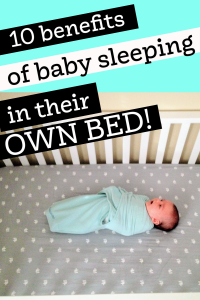


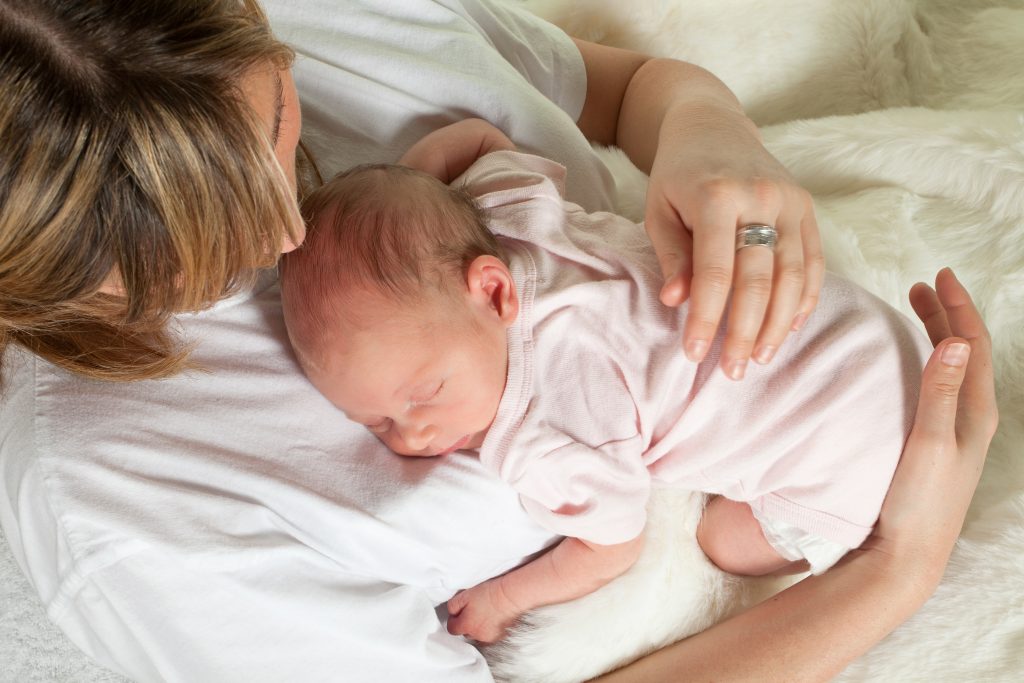
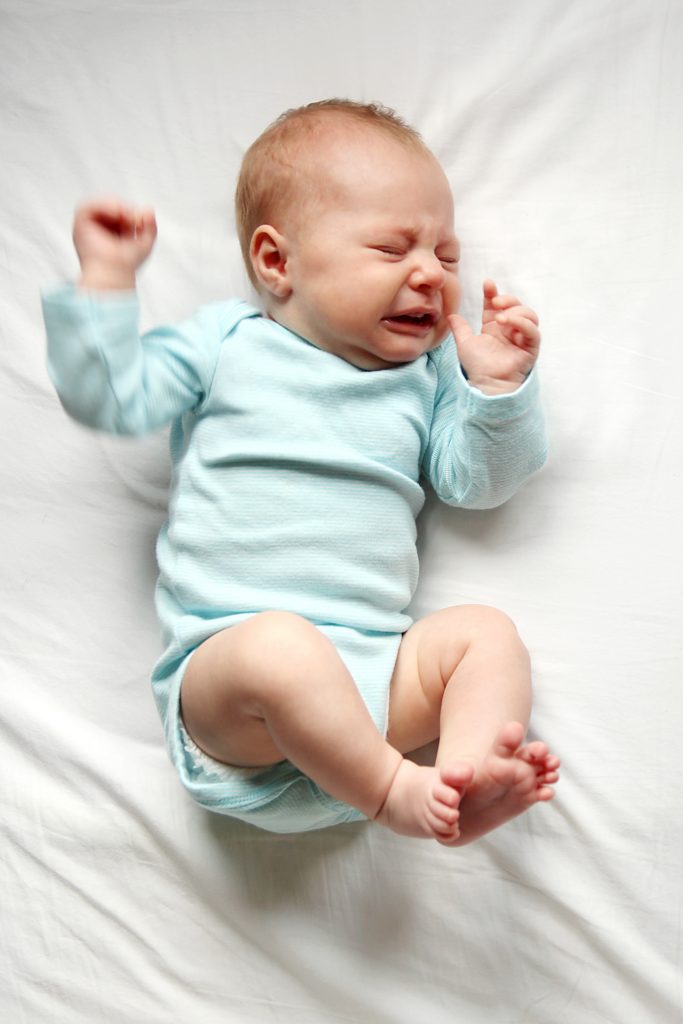
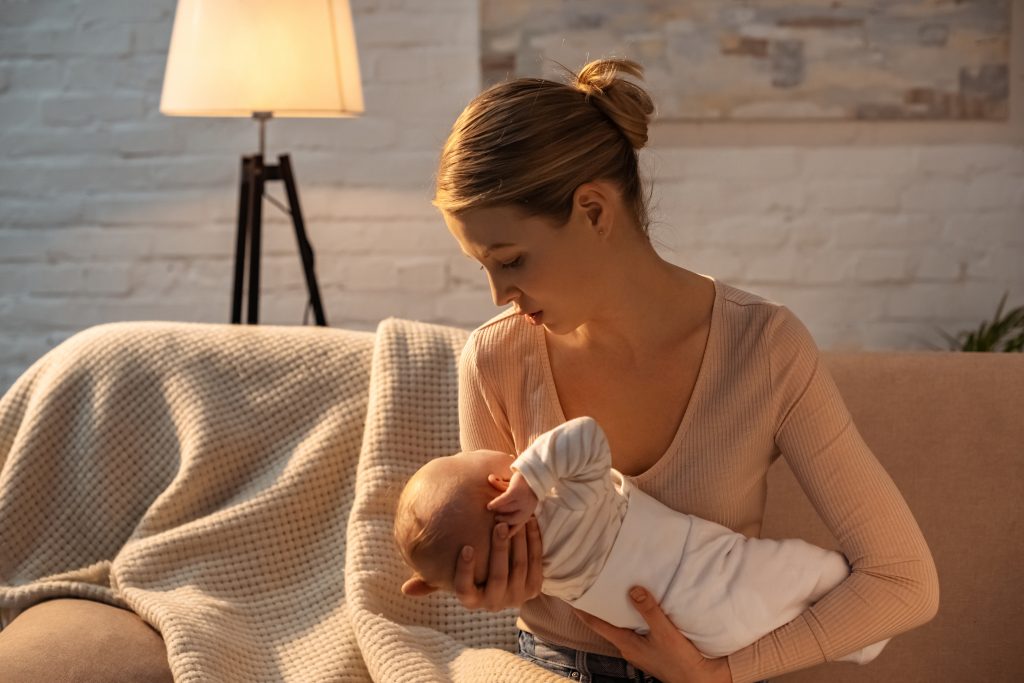
Usually I never comment on blogs but your blog is so convincing that I never stopped myself to say something about it . Keep posting such amazing blogs.